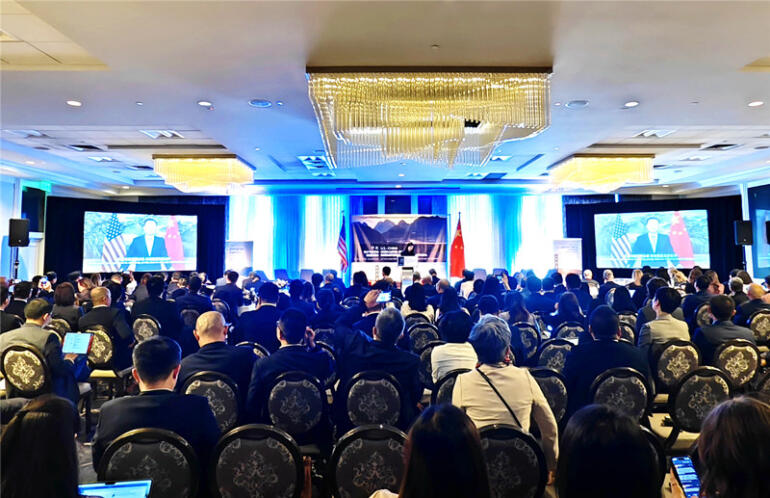
On May 29, 2024, Chinese Ambassador to the United States Xie Feng delivered video remarks at the opening ceremony of the China-U.S. High-level Event on Subnational Climate Action.
Ambassador Xie said that six months ago, President Xi Jinping and President Joe Biden held a historic summit in San Francisco, and laid out a future-oriented San Francisco vision. To turn it into reality, President Xi proposed building five pillars together: namely, to jointly develop a right perception toward each other, jointly manage disagreements effectively, jointly advance mutually beneficial cooperation, jointly shoulder responsibilities as major countries, and jointly promote people-to-people exchanges. When speaking on the phone last month, the two Presidents reaffirmed the importance of turning the San Francisco vision into reality. Stabilizing China-U.S. relations and advancing dialogue and cooperation in various fields serves the common interests of both countries, and also meets the shared expectation of the international community.
Ambassador Xie emphasized that China-U.S. cooperation is indispensable to global climate governance. Over the past decade and more, China-U.S. climate cooperation has gone through ups and downs. We worked closely to bring the international community together to adopt the milestone Paris Agreement. Later, though, such cooperation was stalled for reasons known to all. In recent years, climate cooperation has again resumed. If we can draw any inspiration from this, it is that China-U.S. climate cooperation is inseparable from the overall China-U.S. relationship. It certainly will not work if one asks for dialogue and cooperation but keeps damaging the other side’s interests at the same time, or tries to build roads on one hand but keeps digging holes on the other.
Ambassador Xie pointed out that we are living on the same planet. In the face of climate change, all countries share weal and woe. Only through cooperation can we achieve win-win results, and no one will emerge as a winner from a zero-sum game. Those seeing the coming decade as “the decisive decade” for triumph over China should realize that it is instead the decisive decade for jointly addressing climate crises and avoiding global disasters. With China’s vigorous efforts to develop renewable energy, global costs of wind power have been cut by 80%, and costs of photovoltaic power are down by 90%. Countries around the world are expecting more quality new-energy products from China. As green capacity is in dire shortage worldwide and challenges abound in global energy transition, accusing China of “overcapacity” in green products and resorting to protectionism in the name of competition is hurting the common interests of the entire humanity.
Ambassador Xie stressed that China is a doer in tackling climate change. We have been honoring our commitments, and have adhered to a path of green, low-carbon and sustainable development. China’s installed renewable energy capacity has overtaken that of fossil fuels. It is among the countries with the fastest energy intensity reduction in the world. China will also move from carbon peaking to carbon neutrality in the shortest time span in history. As the largest developing and developed countries, China and the United States have respective strength in energy transition and circular economy. We have every reason to draw on each other and complement one another, and our climate cooperation enjoys huge potential and bright prospects.
Ambassador Xie said that as President Xi Jinping pointed out, the vitality of China-U.S. relations comes from exchanges at subnational levels. Ultimately, the vision of China-U.S. climate cooperation needs to be translated into real action at the subnational level, which requires the participation of enterprises, think tanks and social organizations from both countries. The China-U.S. High-level Event on Subnational Climate Action is therefore highly relevant. We hope delegates from both countries will enhance policy dialogue, information exchange, practice sharing and project collaboration, put our climate cooperation on a more pragmatic, concrete and institutional footing, and inject more impetus into it. We also call on people with vision in both countries to speak out against any attempt to erect green trade barriers and politicize and weaponize climate issues. Ambassador Xie called for jointly taking concrete actions to boost global renewable energy development and green transition, and leave to our future generations a clean and beautiful world.

Held in California, the event is an important step by China and the United States to implement the consensus reached between the two heads of state at the San Francisco summit and expand bilateral climate cooperation. Governor of Guangdong Province Wang Weizhong and Governor of California Gavin Newsom attended the event. Former Governor of California and Chair of the California-China Climate Institute Jerry Brown delivered opening remarks. In addition to Ambassador Xie Feng, China’s Special Envoy for Climate Change Liu Zhenmin, U.S. Senior Adviser to the President for International Climate Policy John Podesta, and U.S. Ambassador to China Nicholas Burns also delivered video remarks. Vice Chairman of the National Development and Reform Commission of China Zhao Chenxin and U.S. Deputy Special Envoy for Climate Rick Duke attended the event and made remarks. More than 200 delegates from 20 provinces, states and cities, including Guangdong, Shanghai, Beijing, Chongqing and the Hong Kong Special Administrative Region of China, and Montana, Washington, Maryland, Minnesota and Arkansas of the United States, as well as enterprises and think tanks of the two countries, attended the event.
 CGTN America
CGTN America